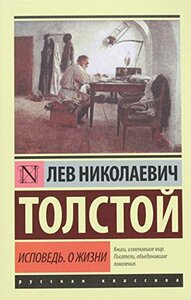Take a photo of a barcode or cover
Tolstoys midlife crisis is all rather dramatic.
I can’t remember the last time I cried from reading a non-fiction book.
In this semi-autobiographic, relatively short book, Tolstoy tells us the story of the worst years of his life.
In his 50s, he finds his life filled with all the blessings we can hope for — he has a beautiful family, riches beyond imagination, a remarkable writing career, and he is physically and mentally fit. Yet, he finds himself in a black hole of depression. He faces a complete lack of meaning, hopelessness, and separation from reality.
The story tells about the sorrows of living in that state and his journey towards meaning and love.
This is a first-person story about how the famous Leo Tolstoy saved himself from suicide.
You can read the remainder of the review and my personal note on it on my blog.
In this semi-autobiographic, relatively short book, Tolstoy tells us the story of the worst years of his life.
In his 50s, he finds his life filled with all the blessings we can hope for — he has a beautiful family, riches beyond imagination, a remarkable writing career, and he is physically and mentally fit. Yet, he finds himself in a black hole of depression. He faces a complete lack of meaning, hopelessness, and separation from reality.
The story tells about the sorrows of living in that state and his journey towards meaning and love.
This is a first-person story about how the famous Leo Tolstoy saved himself from suicide.
You can read the remainder of the review and my personal note on it on my blog.
dark
informative
mysterious
reflective
sad
slow-paced
I didn't realize that this was an autobiography when I was recommended this from a friend after reading various of Tolstoy's short stories. It was really interesting but I didn't find it easy to engage with or truly understand his final stance on his aspect of faith by the end.
He's a great writer and a very valuable near testimony, but it didn't sound to me that he was so clear in the end as he was in his other works in how he felt and understood what he believed other than the start of shifting that understanding.
A well written essay but not something I would read again with the lack of comprehension I maintained, I hadn't realized that this was written before Tolstoy had found his faith.
So he was trying to rationalize the meaning of life without God in the context and that's what this book is.
I honestly didn't know what it was when I picked it up and I thought that this was his testimony of how he found his faith. I was rather disappointed, but I just didn't feel like he made a clear point as to what the meaning of life was. Aside from being the love that we are (ot not) at the root of all that is who we're meant to be in our connections with others, (which is and can only be through Jesus Christ!)
But he would go on to find that out later.
He's a great writer and a very valuable near testimony, but it didn't sound to me that he was so clear in the end as he was in his other works in how he felt and understood what he believed other than the start of shifting that understanding.
A well written essay but not something I would read again with the lack of comprehension I maintained, I hadn't realized that this was written before Tolstoy had found his faith.
So he was trying to rationalize the meaning of life without God in the context and that's what this book is.
I honestly didn't know what it was when I picked it up and I thought that this was his testimony of how he found his faith. I was rather disappointed, but I just didn't feel like he made a clear point as to what the meaning of life was. Aside from being the love that we are (ot not) at the root of all that is who we're meant to be in our connections with others, (which is and can only be through Jesus Christ!)
But he would go on to find that out later.
challenging
dark
emotional
hopeful
inspiring
reflective
slow-paced
reflective
medium-paced
hopeful
inspiring
reflective
medium-paced
challenging
dark
inspiring
reflective
medium-paced
As Norm McDonald said, “all great writers speak to you in some manner, but Tolstoy is the only writer who can speak for you.” This is perhaps the most important book in which that is so, as it concerns the question, “why do I live?”. Tolstoy claims he lived a life in which this question occurred to him as a child, and was answered by religious faith. But then, as with all men of his class and social circle that child like faith dissipates when the conditions of life (namely of the lifestyle of the educated wealthy classes) no longer are in keeping with the lifestyle of the Christian faithful (I.e., living in accordance with the teachings of Jesus). And so, like many, the answer comes from whatever social or natural science the educated come to believe in. But Tolstoy points out that none of these sciences actually provide answers to the question of “why”, and can at best describe “how” one lives.
And so in the end one is left believing life is meaningless, or in accepting upon faith that it is not. He concludes that only peasants life lives in accordance with their faith and hopes to align his life as best he can with such a way of being.
And so in the end one is left believing life is meaningless, or in accepting upon faith that it is not. He concludes that only peasants life lives in accordance with their faith and hopes to align his life as best he can with such a way of being.
Very enlightening and absorbing. I find myself agreeing with Tolstoy's overall perspective on religion, and relating to his existential fears. It does begin to drone on a bit around halfway however, so minus points for what seems rather repetitive.
challenging
dark
funny
informative
inspiring
reflective
sad
slow-paced







